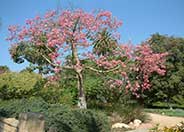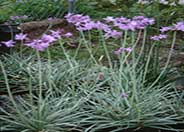
Common name:Floss Silk Tree, Kapok
Botanical name:Chorisia speciosa
This deciduous tree grows 30' to 60' tall and 30' wide; it has a trunk covered in short spines. It produces beautiful pink flowers in the fall and needs occasional deep watering with good drainage. Leaves drop during autumn flowering or whenever temperatures drop below 27 degrees F.

Common name:Silver Lace Society Garlic
Botanical name:Tulbaghia violacea 'Silver Lace'
This evergreen perennial has 1'-2' long stems with white, margined leaves and rosy/lavender/pink flowers that bloom in spring and summer.

Common name:Compact Karo
Botanical name:Pittosporum crassifolium 'Compactum'
Pittosporum crassifolium 'Nana' is an evergreen shrub or tree. It can reach 25' tall and 20' wide in 8-10 years. Branches are densely clothed in gray green, with 1"-2" long leaves that have rounded ends. It produces maroon flowers in late spring.

Common name:Lily of the Nile
Botanical name:Agapanthus africanus
This evergreen groundcover/shrub will grow about 3' tall and has large green leaves with blue flowers ( there is also a white variety) that bloom in spring and summer. It will grow in all soils but prefers loam soil.

Common name:Frades or Compact Escallonia
Botanical name:Escallonia X exoniensis 'Frades'
The 'Frades' is an evergreen shrub that grows to 6'-8' tall and wide. It is valued for its glossy foliage and clusters of pink flowers. The heaviest bloom period is during spring and fall, with some flowers all year. The Escallonias grow best in sun to part shade, but will tolerate mostly shade if necessary. These plants usually need little or no summer watering. This is the most tolerant of poor drainage of all Escallonia varieties. -Monterey Bay Nursery
Dealing With Drought
More than half of the water used at your home is for outside purposes. Studies show that on average, half of the water used outdoors is wasted. The leading cause of waste is incorrectly set and poorly managed irrigation controllers. The second biggest cause of wastage is broken irrigation equipment that goes undetected. There are a few basic things you can do to make a big difference in your water use.
Click in the green box for more information
| Designer: Nan Simonsen Nanscapes | Daylilies along the Walk |
Photographer: GardenSoft |
Soils and Compost:
Physical weed control, including mulching, or hand removal protects the watershed from harmful chemicals.
Water Saving Tip:
Be sure to fix all leaks promptly no matter how small they may seem.
Integrated Pest Management:
Develop healthy soil for plants that are vigorous and naturally pest-resistant.

